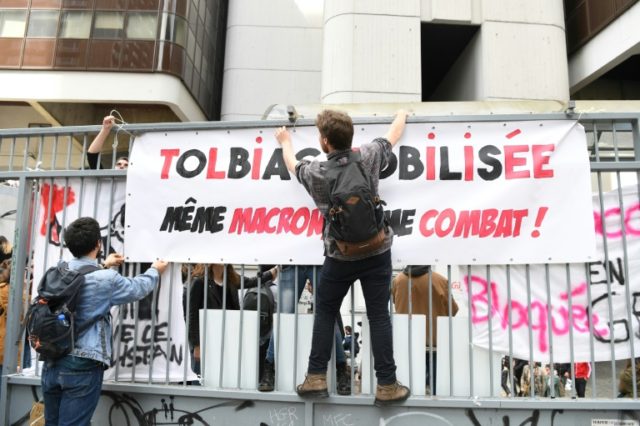Paris (France) (AFP) – Sitting at a fountain outside the Sorbonne University in Paris, Christian Faucomprez recalls his heady days as an anti-capitalist student in May 1968 when the campus was the epicentre of a social and cultural rebellion.
He remembers corridors strewn with the sleeping bags of students who occupied the building in a standoff with paternalistic post-war leader Charles de Gaulle that turned central Paris into a battleground.
“And at night we weren’t always sleeping,” he says mischievously, alluding to the push for greater sexual freedom that accompanied the upheaval.
Fifty years later, the snowy-haired 72-year-old returned to the scene on Tuesday to join several hundred students and leftist activists who marched from the Sorbonne through the capital’s Left Bank in protest over President Emmanuel Macron’s tightening of university entrance requirements.
Shouting “Resistance!” and “Free our Comrades!” — the rallying cry of May 68, used to condemn the arrests of students — the protesters urged rail workers, pensioners and civil servants to oppose the president’s reform agenda.
The numbers mobilised so far are a drop in the ocean of the 10 million that went on strike in 1968, or the million-strong demonstrations in 1995 that forced the rightwing government of the day to withdraw pension reforms.
But Faucomprez is convinced it is the start of something big.
“We were only a few hundred on the first day in 1968. It’s only starting to mature,” he said.
– Education for all –
Students began occupying a handful of universities in March over plans to give public universities the power to set admission criteria and rank applicants — moves students assailed as a violation of the French principle of free education for all.
Currently, students who pass their school-leaving “baccalaureat” exam can enrol in any university course, a situation blamed by the government for overcrowding and the failure of 60 percent of students to complete their degree within four years.
The situation reached a crisis point last year, with universities using a lottery system to share out places in dozens of oversubscribed courses, causing disappointment for thousands.
Now, public universities will be given access to a student’s school records to help them select those whose “motivation” and “aptitudes” best match the course on offer.
For Florian Mazet, who studies economics at the Nanterre University west of Paris that fired up the 1968 protests, the changes are nothing short of a betrayal of French values.
“In France we have a social model based on aspirations that include the right to study what you choose,” he said.
He worries that universities will recruit mainly from the top of the academic pile for sought-after courses like law and psychology, leaving youngsters from underprivileged neighbourhoods by the wayside.
It’s a concern shared by Paul Guillibert, a philosophy lecturer at Nanterre.
“Universities are the last bastion of egalitarianism in this country,” the 31-year-old said, comparing the 70-odd public universities, which charge only nominal fees for a basic degree, with the ultra-selective “grandes ecoles” which groom top executives, engineers and public servants.
– Natural selection –
Higher Education Minister Frederique Vidal has promised that weaker students will be offered catch-up classes to meet new minimum course requirements.
But in an open letter Tuesday some 400 professors said they had seen no sign of the one billion euros ($1.24 billion) she promised to fund the reforms.
The professors also blamed “drastic budget cuts” over the past decade for the falling standards.
With end-of-year exams looming and a handful of campuses still blocked by increasingly radicalised protesters, tensions are rising.
On Monday, riot police stormed Nanterre to remove a group of several dozen students who staged a sit-in, injuring at least one student and arresting seven.
On Wednesday, the head of the Sorbonne also appealed for police backup after clashes between student backers and opponents of a sit-in at a faculty in eastern Paris where a store of petrol bombs was found at the weekend.
Universities in Montpellier, Toulouse, Bordeaux, Strasbourg and Rennes, among other cities, have also been partly or totally blocked.
Voicing growing public frustration with the protests, Caroline Kahn, a doctoral student in civil law, argued that a brutal selection process was already in operation.
“It’s called selection by failure,” said Kahn, whose first-year lectures packed in 1,000 students — only a third of whom returned the following year.
“We are the only country in Europe where universities are not a place of excellence. It’s frustrating,” said the smartly dressed 24-year-old, who spent an exchange year at Britain’s Oxford University.
“To those who fear selection I’m tempted to say: Work harder!”

COMMENTS
Please let us know if you're having issues with commenting.